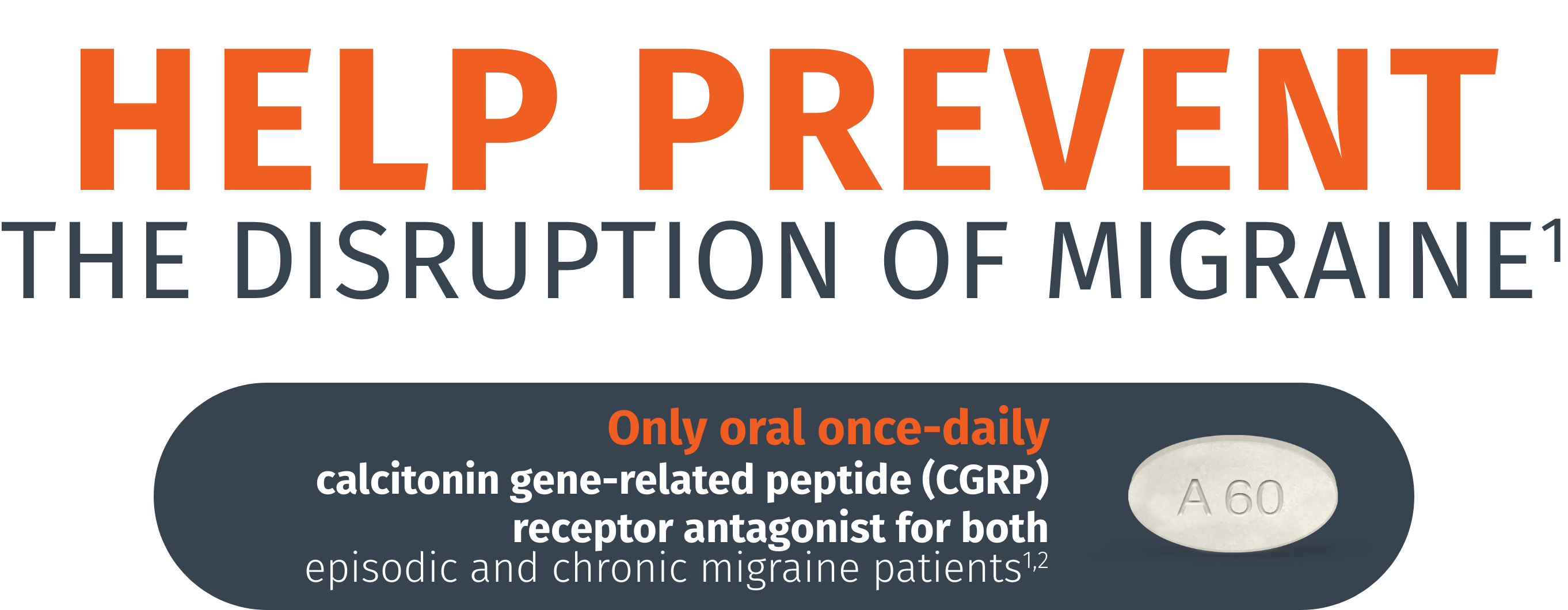AQUIPTA™ PROVIDES MIGRAINE PREVENTION THAT:
HAS COMPREHENSIVE EFFICACY*1,4–7
- Effective reduction in mean monthly migraine days (MMDs) across 12 weeks:†1
- Episodic migraine: 52.6% reduction with AQUIPTA™ 60 mg once daily (n=226) vs. 33.3% placebo (n=216); p<0.001†1
- Chronic migraine: 35.4% reduction with AQUIPTA™ 60 mg once daily (n=257) vs. 26.8% placebo (n=249); p=0.002†1
- Rapid migraine prevention at Week 1:‡5
- Significant reduction from baseline in mean weekly migraine days at Week 1 of the episodic migraine study: 52.6% for AQUIPTA™ 60 mg once daily vs. 15.8% with placebo; p<0.0001‡5
- Sustained migraine prevention:§6
- Reduction in mean MMDs of 71.2% from baseline achieved by Weeks 49–52 in patients with episodic migraine taking AQUIPTA™ 60 mg once daily who completed treatment§6
- Improvements in function at Week 12:||1,4,7
- Episodic migraine: change from baseline in Migraine Specific Quality of Life Questionnaire version 2.1 (MSQ v2.1) Role Function-Restrictive (RFR) score of 31.2 with AQUIPTA™ 60 mg once daily (n=222) vs. 20.4 with placebo (n=214); p<0.001||4
- Chronic migraine: change from baseline in MSQ v2.1 RFR score of 23.3 with AQUIPTA™ 60 mg once daily (n=256) vs. 17.2 with placebo (n=246); p=0.0009||7
OFFERS THE POSSIBILITY OF DAYS FREE FROM MIGRAINE¶6,8,9
0 migraine attacks in:
- 27.7% of AQUIPTA™ 60 mg once-daily treated patients with episodic migraine (n=222) in Weeks 9–12**8
- 48.4% of remaining AQUIPTA™ 60 mg once-daily treated patients with episodic migraine (n=162/335) in Weeks 49–52§6
- 7.4% of AQUIPTA™ 60 mg once-daily treated patients with chronic migraine (n=256) in Weeks 9–12††9
Free from migraine defined as 0 attacks in a defined period.
IS GENERALLY WELL TOLERATED VS. PLACEBO*4,7
With adverse reactions leading to discontinuation similar in the placebo and AQUIPTA™ 60 mg once daily arms for patients with episodic migraine (2.6% AQUIPTA™ 60 mg vs. 2.7% placebo) and chronic migraine (3% AQUIPTA™ 60 mg vs. 4% placebo)*4,7
- Most commonly reported adverse events (AEs) (≥5%) in the 12-week ADVANCE study in patients with episodic migraine were constipation (6.9% AQUIPTA™ 60 mg once daily vs. 0.5% placebo) and nausea (6.1% AQUIPTA™ 60 mg once daily vs. 1.8% placebo)4
- Most commonly reported treatment-emergent adverse events (TEAEs) (≥5%) in the 12-week PROGRESS study in patients with chronic migraine were constipation (10% AQUIPTA™ 60 mg once daily vs. 3% placebo), nausea (10% AQUIPTA™ 60 mg once daily vs. 4% placebo) and dizziness (5% AQUIPTA™ 60 mg once daily vs. 3% placebo)7
IS SIMPLE TO TAKE1
One tablet, daily1
AE, adverse event; AIM-D, Activity Impairment in Migraine-Diary; CGRP, calcitonin gene-related peptide; ICHD, International Classification of Headache Disorders; IE, Ireland; mITT, modified intent-to-treat; MMD, monthly migraine day; MSQ, Migraine-Specific Quality of Life Questionnaire; PDA, Performance of Daily Activities; PI, Physical Impairment; RFR, Role Function-Restrictive; TEAE, treatment-emergent adverse event.
*AQUIPTA™ was evaluated for the prophylaxis of migraine in two pivotal studies. The episodic migraine study (ADVANCE) enrolled patients who met International Classification of Headache Disorders (ICHD) criteria for a diagnosis of migraine with or without aura. The chronic migraine study (PROGRESS) enrolled patients who met ICHD criteria for chronic migraine. Both studies excluded patients with myocardial infarction, stroke or transient ischaemic attacks within 6 months prior to screening.1 †Effectiveness was based on the primary endpoint of reduction in mean monthly migraine days from baseline across 12 weeks in the ADVANCE and PROGRESS studies.1,4,7 Episodic migraine: AQUIPTA™ 60 mg –4.1 (from 7.8 baseline) vs. placebo –2.5 (from 7.5 baseline); chronic migraine: AQUIPTA™ 60 mg –6.8 (from 19.2 baseline) vs. placebo –5.1 (from 19.0 baseline).1 ‡Rapid efficacy based on exploratory endpoints in the ADVANCE study which included the proportion of participants with a migraine on each day during the first week of treatment.5 At Week 1: –1.0 day for AQUIPTA™ 60 mg vs. –0.3 days with placebo (baseline 1.9 days in both arms).5 §Data from an open-label safety study that randomised 744 patients 5:2 to receive either AQUIPTA™ 60 mg (N=546) or standard of care migraine prevention medication (n=198). Of N=546 randomised to the AQUIPTA™ 60 mg arm, n=373 (68.3%) completed 52 weeks’ treatment. The study enrolled adults who had completed the previous Phase 2b/3 trial, who re-established study eligibility, and de novo patients. All eligible participants had 4–14 migraine days in the 28-day baseline period. Efficacy measures included changes from baseline in least squares mean monthly migraine days which was evaluated using the modified intent-to-treat (mITT) population (n=521 AQUIPTA™-treated patients) and a mixed-effects model for repeated measures. Efficacy endpoints for long-term efficacy evaluation were not classified as primary, secondary or additional endpoints. Clinical efficacy outcomes were only collected from the AQUIPTA™ arm by eDiary data.6 Weeks 49–52: –5.2 days vs. 7.3 days baseline.6 In an open-label extension with observed data, there is potential for enrichment of the long-term data as those who remain in the study generally fare better than those who discontinue. ‖Additional endpoints in the ADVANCE and PROGRESS studies included change from baseline at Week 12 for MSQ v2.1 RFR domain score and the Activity Impairment in Migraine-Diary (AIM-D) Performance of Daily Activities (PDA) and Physical Impairment (PI) scores. The MSQ v2.1 RFR domain score assesses how often migraine impacts function related to daily social and work-related activities. The AIM-D evaluates difficulty with performance of daily activities (PDA domain) and physical impairment (PI domain) due to migraine.4,7 ¶Free from migraine defined as 0 attacks in a defined period. **A secondary analysis of the ADVANCE study evaluating the efficacy and safety of AQUIPTA™ for the preventive treatment of episodic migraine.8 ††An additional analysis of the PROGRESS study evaluating the efficacy and safety of AQUIPTA™ for the preventive treatment of chronic migraine.9
References:
- AQUIPTA™ (atogepant) IE Summary of Product Characteristics. August 2023.
- Morena-Ajona D, et al. J Clin Med. 2022;11(6):1656.
- Ferrari MD, et al. Nat Rev Dis Primers. 2022;8(1):2.
- Ailani J, et al. N Engl J Med. 2021;385:695–706.
- Schwedt TJ, et al. Cephalalgia. 2022;42(1):3–11.
- Ashina M, et al. Headache. 2023;63(1):79–88.
- Pozo-Rosich P, et al. Lancet. 2023;402(10404):775–785 (Supplementary Appendix).
- Lipton RB, et al. JAMA Netw Open. 2022;5(6):e2215499.
- Lipton RB, et al. Migraine Trust International Symposium (MTIS) 2022,
8–11 September; London, UK.
ALL-AQP-230003 March 2024
Reporting suspected adverse reactions after authorisation of the medicinal product is important. It allows continued monitoring of the benefit/risk balance of the medicinal product. Healthcare professionals are asked to report any suspected adverse reactions via [INSERT NATIONAL REPORTING SYSTEM].




